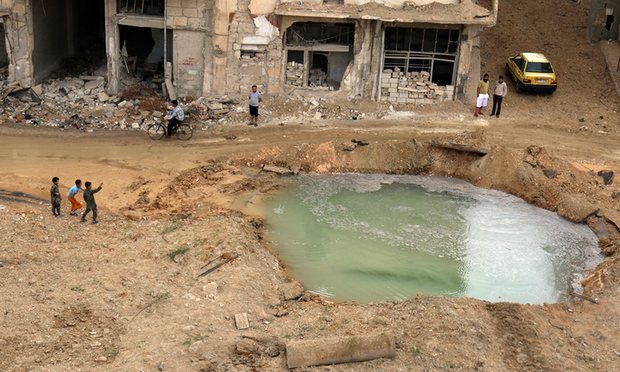You are here
Syria Bombings Leave 1.75 Million Without Running Water in Aleppo
Primary tabs

People inspect a water-filled hole at the site of an airstrike on the rebel-held Tariq al-Bab neighbourhood of Aleppo. Photograph: Abdalrhman Ismail/Reuters
Unicef says children at risk of outbreaks of waterborne diseases after two pumping stations left out of action
theguardian.com - September 24, 2016
Heavy bombardment of the rebel-held eastern area of Aleppo has left about 1.75 million people without running water, the United Nations has said.
Intense attacks on Friday prevented repairs to the city’s damaged Bab al-Nayrab pumping station, which supplies water to 250,000 people in the eastern parts of the city, according to the UN’s children’s agency, Unicef.
In retaliation, the nearby Suleiman al-Halabi station, which pumps water to 1.5 million people in the west of Aleppo, was switched off, it said.



Комментариев
Unrelenting Assault - Aleppo Is Worst Yet in Five-Year Civil War
nytimes.com - by RICK GLADSTONE and SOMINI SENGUPTA - September 26, 2016
Unfazed by Western accusations of war crimes and barbarity in the ferocious aerial assault on Aleppo, the Syrian government and its Russian ally intensively bombed the northern Syrian metropolis for the fourth consecutive day on Monday. Residents and rescuers there described the bombardment as among the worst yet in the five-year war.
Insurgent-held neighborhoods in eastern Aleppo were hit with dozens of air attacks in the predawn hours, killing and wounding many people, according to doctors, nurses and activists in the city.
The Aleppo Media Center, a group of antigovernment activists and citizen journalists who have sought to document the conflict, posted graphic video footage shot Sunday of bombing victims treated at a hospital in a rebel-held part of the city.
Stockpiles of food and supplies have dwindled to near nothing on the rebel-held side, according to a report from Aleppo by Agence France-Presse. It also said a shortage of blood for transfusions had forced doctors at the few functioning hospitals to amputate limbs of the seriously wounded.
(READ COMPLETE ARTICLE)